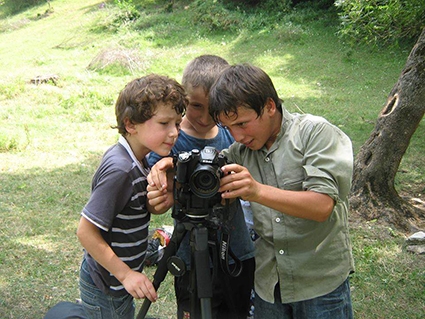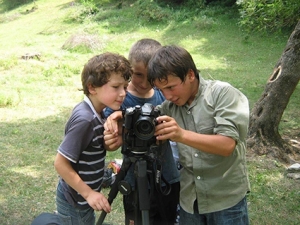A Social Enterprise that Should Not Be Closed
Three Social Enterprises was created in the Pankisi Gorge this year whose aim is to improve living conditions in the region and develop vital services. Yet despite the good work of all three projects, unfortunately, two of them look as if they’ll be closing within the next few months. One of them is the Matsne children’s daycare center.
“Our children spent all their time on the streets or in the mosque; they had no capacity to identify and develop their abilities. We do not even have a normal entertainment infrastructure – no sports fields or playgrounds or even libraries,” said Gulnazi Gunashashvili, founder of the Matsne center whose idea in opening the center came from the desire to raise a better generation and show children prospects in life.
In the framework of the Arbeiter-Samariter-Bund’s project, which promotes the development of Social Enterprises in Georgia’s regions, the Matsne center was founded in the village of Dumasturi, Pankisi Gorge, Georgia, at the begging of 2015. The center works on weekends and helps school-age children not only to cope with different school tasks, but also to develop their other abilities.
“We help children to do their homework, for example, in foreign languages, because not all parents know them, or in the villages we have a lot of multi-children families, and parents do not have time to deal with all of their offspring. In addition, we watch movies; children themselves are connected to the film selection process. We also tried to pay attention to their physical activity – children swim in the pool or in the river, in good weather we always play in the yard: football, volleyball, dominoes and so on,” said Gunashashvili.
It is worth noting that the Pankisi Gorge has always been in the media spotlight. More than 90% of the population are from an ethnic group called Kists, of Chechenya, who are descendants of immigrants who came during the Chechen war. According to various sources, the unstable situation in the region leads to the fact that a large number of residents are sent out to fight as part of the Islamic State (IS). And one of the leaders of IS, Tarkhan Batirashvili, also known as Abu Omar al-Shishani, a native of Pankisi Gorge, still has an influence in the region.
Locals often say that they are totally against IS, but cannot do anything about the outflow of people. The existence of this issue in the region underlines the importance of such a projects as ‘Matsne’, which help children’s development and rejection of IS. Gulnazi Gunashashvili argues that in particular during her work she had to face many challenges posed by religious and ethnic features.
“According to our religion, we cannot sing and draw. In my opinion, this is wrong as such capabilities help the child develop and interact with the outside world, and we are very pleased that we were able to overcome this problem; now all our children sing, dance and draw,” noted Gunashashvili. “Some of children found their ability to draw in our center, simply because at home they had never been engaged in it,” she added.
ASB’s project coordinator Giorgi Arsenidze said that one of the main objectives of the Social Enterprises Support project is to involve public authorities in helping solve the problems of the population. Through this program, the first year is fully funded by the European Union, and from the following year, local governments must take on their guardianship.
Despite the fact that ASB have successful examples when local governments fully took on funding of Social Enterprises in regions such as Kvemo Kartli and Samegrelo, the situation in Pankisi Gorge is a little more complicated. At the moment, local authorities have agreed to support only the Medina center, which is dealing with the problems of people with disabilities. That means that ‘Matsne’ is likely to be closed next year.
“It is impossible to continue to work without financial assistance: we have to pay salaries to the cook, the teachers; we have to buy children’s exercise books, drawing supplies, etc. Most parents are not able to provide even minimal financial assistance. It will be a pity if we have to close the center. We really don’t want the children to be forced back out onto the street, it is extremely important to give them an opportunity to grow and nurture the right values,” said Gunashashvili.
Eka Karsaulidze












